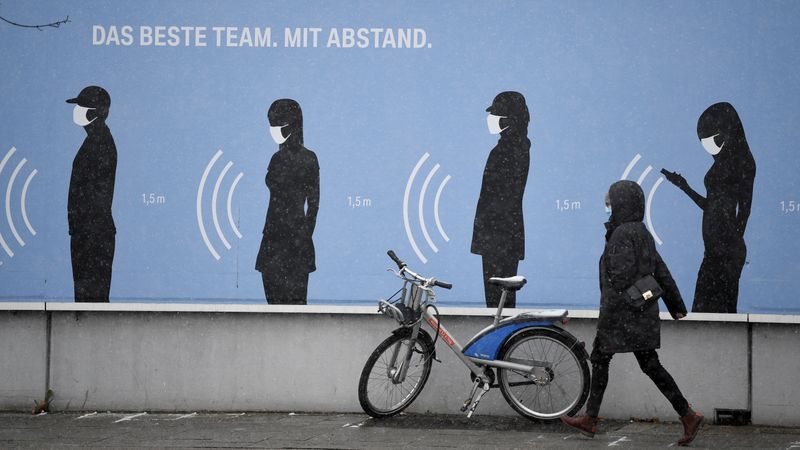By Richa Rebello
BENGALURU (Reuters) - The euro zone economy will recover at a much weaker rate this quarter than expected only a month ago, according to a Reuters poll of economists who cited a slower vaccine rollout as the biggest risk over the next three months.
Britain and the United States have successfully inoculated large swathes of their populations but the euro zone vaccine rollouts, already riddled with problems, have hit more trouble recently just as infection rates rise.
While the April 12-15 Reuters survey showed the bloc was set to emerge from a double-dip recession and grow 1.5% this quarter, it was a sharp downgrade from 2.1% predicted in March and the lowest consensus since a poll in October.
Over 90% of economists, or 38 of 42, who answered an additional question said the biggest risk to that already modest outlook would be a slower vaccination drive.
Of those economists who said a slower vaccine rollout was the biggest risk, 85% either downgraded their Q2 growth forecast or kept it unchanged.
"The turn of the first quarter is where things became more complicated for Europe and it will have a negative impact on the first half of the year," said Yvan Mamalet, senior euro economist at Societe Generale (OTC:SCGLY).
"If the rollout of vaccinations doesn't speed up as much as we expect, it will probably mean lifting of restrictions will be at a later stage and the return to quasi-normality will have to be delayed further."
Reuters poll graphics on the euro zone economy and ECB outlook: https://fingfx.thomsonreuters.com/gfx/polling/bdwvkbzgopm/Euro%20zone%20April%20EQ.PNG
The bloc was expected to expand 2.3% in Q3 and 1.3% in Q4, roughly unchanged from March. But the range of forecasts for quarterly growth showed lower highs.
On an annual basis, the euro zone economy was expected to grow on average 4.1% in 2021, down from 4.3% predicted last month and the lowest prediction since a poll in April last year.
It was also lower than the International Monetary Fund's forecast of 4.4%.
For 2022, growth was forecast at 4.1%, down from 4.2%.
The three largest of the bloc's 19 national economies were expected to grow at a much slower rate in 2021 compared with expectations in January.
The consensus for growth in Germany was 3.2%, down from 3.7% previously, and the outlooks for France and Italy were downgraded to 5.4% and 4.1%, respectively, from 5.9% and 5.1%.
"Our euro zone scenario, based on a downward revision in the first half of the year caused by the pandemic's damage, followed by a rebound in the summer, assumes more modest growth for 2021 as well as 2022," said Louis Harreau, euro zone economist at CA-CIB.
"The growth differential between the euro zone and the other major advanced economies is widening, and intra-zone fragmentation persists. France and Germany should return to pre-crisis GDP by mid-2022; Italy and Spain are likely to still fall short at the end of 2022."
When asked on the risks to their inflation outlook over the coming year, over 80% of economists, or 30 of 37, said they were skewed more to the upside.
The consensus showed inflation rising to average 2.1% in Q4 2021, but slowing sharply next year to 1.2%, 1.3%, 1.3% and 1.3% in each quarter, respectively.
Reuters poll graphic on euro zone economic growth and inflation outlook: https://fingfx.thomsonreuters.com/gfx/polling/qzjpqzykqvx/Reuters%20poll%20graphic%20on%20Euro%20zone%20economic%20growth%20and%20inflation%20outlook.PNG
Asked when the European Central Bank was likely to start winding down its Pandemic Emergency Purchase Programme, about 60% of economists, or 21 of 37, said the second quarter of 2022 or later.
While Dutch central bank chief, Klaas Knot, said the central bank would start phasing out its emergency bond purchases in the third quarter and end them in March 2022 as per plan, only a handful of economists said the start would be sometime in the second half of 2021.
"The euro zone economy will still not have made a full recovery from the pandemic even at the end of 2022. The ECB will be at pains to reassure investors that the Bank has sufficient firepower and flexibility," said Andrew Kenningham, chief Europe economist at Capital Economics.
"The best way to provide this reassurance would be to extend the duration of the PEPP itself."
